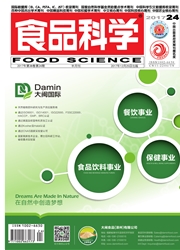

 中文摘要:
中文摘要:
利用恶唑酮复制小鼠溃疡性结肠炎(UC)以研究乳源酪蛋白糖巨肽(CGMP)对溃疡性结肠炎的影响。空白对照组小鼠仅饲喂普通鼠食,模型对照组与3个CGMP组灌注恶唑酮诱导溃疡性结肠炎,诱导建模后对3个CGMP组小鼠分别灌胃低、中、高剂量的CGMP(剂量分别为5、50、500mg/(kgbw·d)),连续灌胃5d。期间记录小鼠每天体质量变化,末次灌胃后检测小鼠血清中二胺氧化酶(DAO)活性以及结肠中髓过氧化物酶(MPO)活性和丙二醛(MDA)含量,并观察结肠组织形态。结果表明:低、中、高剂量CGMP均可在一定程度上改善恶唑酮诱导的小鼠溃疡性结肠炎病症,尤其以中剂量CGMP的作用较为明显,因此证实CGMP作为一种营养手段调理溃疡性结肠炎具有很好的前景。
 英文摘要:
英文摘要:
In order to explore the effect of casein glycomacropeptide (CGMP) on xazolone-induced ulcerative colitis in mice,the control group was fed regular diet,while the model group and three treatment groups were administered CGMP at three doses of 5,50 mg/(kg bw·d) and 500 mg/(kg bw·d) by oral gavage for 5 days after oxazolone challenge.The change of body weight was daily recorded and diamine oxidase (DAO) activity in serum,myeloperoxidase (MPO) activity,malonaldehyde (MDA) content in colon,and histological change of colon were determined after the last administration.Treatments with the three doses of CGMP showed improvement on oxazolone-induced ulcerative colitis,while the dose of 50 mg/(kg bw·d) CGMP seemed to be better.In conclusion,CGMP holds promising potential to be applied in a nutritional therapy for the treatment of ulcerative colitis.
 同期刊论文项目
同期刊论文项目
 同项目期刊论文
同项目期刊论文
 期刊信息
期刊信息
